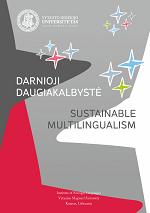Academic Listening in Foreign Languages: Lexical Processing of Spoken Texts in Speciality
Academic Listening in Foreign Languages: Lexical Processing of Spoken Texts in Speciality
Author(s): Inese OzolaSubject(s): Foreign languages learning
Published by: Vytauto Didžiojo Universitetas
Keywords: academic listening; ESP; lexical segmentation; background knowledge; context
Summary/Abstract: The aim of the present paper is to analyse the perception of recorded spoken texts in a foreign language by undergraduate students in ESP classes. The study explores the role of the background knowledge and pragmatic information in recognizing lexical units in the stream of speech. The paper describes a case study of undergraduate students’ performance in acquiring special vocabulary in ESP classes while listening to a recorded text in the field of speciality. The two main tasks of the listener in word recognition are the identification of words and activation of knowledge of their meaning. There are two models of spoken texts comprehension processes: bottom-up and top-down. Language learners have to apply the previous knowledge of the world and knowledge of the context trying to infer the meanings of words in the context. Thus in educational settings, where a listening activity is partly de-contextualised, pre-listening activities stimulate students’ knowledge of the world in the form of schemata, and they use it to infer the meaning of unknown words or words they cannot recognise in the stream of speech in a foreign language. There are three processes that account for a word in a foreign language being remembered: noticing, retrieval and generative use. “Noticing” means creating the awareness of the word, “retrieval” involves recall of the previously studied or noticed words, “generating” means a creative use of the word in different tasks. During the study the undergraduate students of Economics, Latvia University of Agriculture, participated in vocabulary tests that checked their knowledge of lexical units acquired incidentally during listening activities, which involved pre-, while- and post-listening tasks with repeated opportunities to meet the same vocabulary in the process of the listening activity. The method called the “time series design” was applied in the case study. It can be represented graphically in the following way: T1 X PT1+PT2, where “T1” is the pre-test, “X” is the treatment (the recorded spoken text+exercises), PT1 is the 1st post-test after the treatment and PT2 is the 2nd post-test after another two weeks. The results of Post-test 1 show a noticeable increase in students’ specialised vocabulary knowledge. There is a slight decrease in the knowledge of the target lexical units in Post-test 2 in comparison with Post-test 1, but the specialised vocabulary knowledge retained was superior to the knowledge the students had before listening. The creation of context and activation of the background knowledge in the pre-listening stage helped students to notice the boundaries of unknown specialised vocabulary in the stream of speech, guess the meaning and later retrieve it. Consequently, in the educational environment, it is very important to activate students’ background knowledge giving information about the context of situation and providing students with repeated opportunities to meet the same lexical units during listening.
Journal: Darnioji daugiakalbystė
- Issue Year: 2012
- Issue No: 1
- Page Range: 123-133
- Page Count: 11
- Language: English

